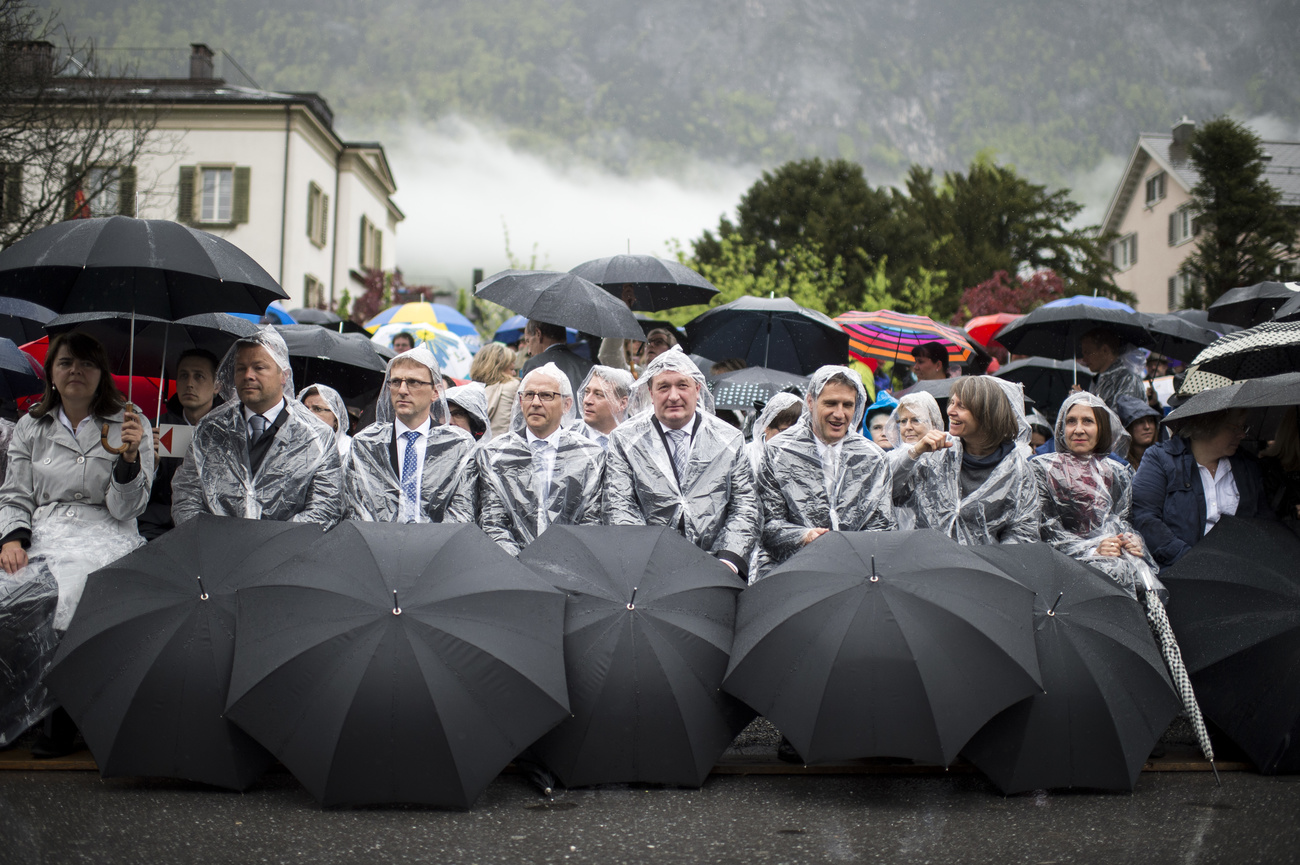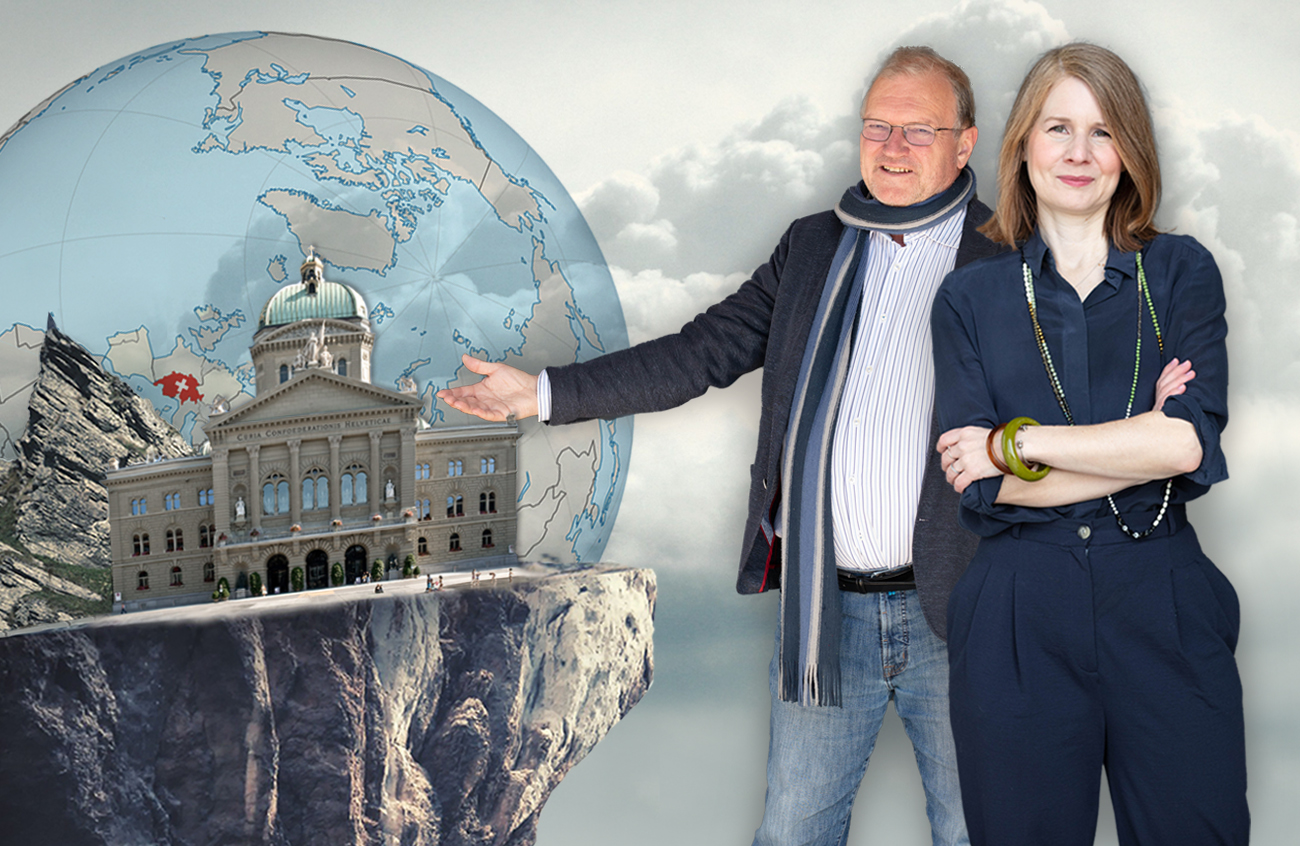
The purest democracy? Visiting one of Switzerland’s historic open-air assemblies

The annual “Landsgemeinde” in Glarus is like a folk festival, an outdoor party, and a crash-course in political science all rolled into one. But is it democratically relevant?
On the first Sunday in May, trains and buses in the small Swiss canton of Glarus are free, and people are on the move early.
At 8am, street vendors are in place in the capital, also called Glarus; a brass band has struck up outside the town hall. Soldiers, tourists, and elegant folk are milling around. For men, the wearing of a broad-brimmed hat seems to confer esteem. It might not be too early for a first beer.
The occasion? Landsgemeinde – the canton’s annual open-air assembly, with roots stretching back to the 14th century, when thousands of citizens gather to vote on everything from taxes to transport policy.
For locals, it’s a calendar highlight. Sean Müller grew up in Glarus and used to attend the assembly with his parents when he was young. He doesn’t remember much of what was discussed. But in a little place where not much happens, he says, it was definitely a “happening”.
A few decades later, Müller’s interests are broader. As a professor of political science at the University of Lausanne, he’s back home this year with a group of students. They want to experience what enthusiasts argue is the purest form of direct democracy; a form enabling each and every citizen with a voting card to take the mic and argue for new laws in front of their peers – if they feel up to the challenge.

Democracy in action
From 9.30am, they get their chance.
After a solemn flurry of oath-taking, proceedings are opened by the Landammann, a sort of president of the cantonal government who acts as MC and adjudicator. Moving through the agenda, he briefly outlines what today’s 12 items are about, before declaring with ritualistic pomp: “the word is free”. If silence follows, the new law passes without a vote. If someone objects, there’s a flurry of mini speeches before a collective decision by the assembly – thousands of orange cards are held aloft as a sign of approval.
Some topics are hotter than others. While next year’s cantonal tax rate is accepted without objection, a plan to introduce several “car-free” days per year around a scenic local lake sparks half a dozen inputs (after haggling, the number of “Slow Sundays” is set at three).
Meanwhile, speakers are more sober than hellraising. Many follow the oratorical tips which appeared in the weekend edition of the local newspaper: speak slowly, structure your argument clearly, and remember that “courage is more important than perfection”.
As for their peers, whom they’re trying to convince, they remain difficult to fathom. There are some grumbles when speakers ramble on, or some laughs at curious inputs (should e-bikes be allowed on car-free Sundays?). But overall, speakers are neither heckled nor cheered; the Landammann’s request – “don’t applaud individual inputs” – is followed, and it’s all quite well-behaved.

More
How Swiss direct democracy works
Counting the hands
That’s not to say it can’t be impressive. Football fans and music festivalgoers know what can happen when thousands of people focus their attention on the same thing. When that thing is the creation of laws, you can understand why some get so emotional about these assemblies. The conservative Weltwoche magazine labelled the Glarus event as the “jewel of democracy”.
At the same time, as the emotions wear off, you may also start to question some things.
For example, should the outcome of binding votes be decided by one man peering into a sea of thousands of hands before estimating if it’s a majority? Wouldn’t credibility be helped by a counting method fit for the digital age?
No thanks, Glarus voters said in 2016, when they rejected any intrusion of electronic voting aids. They place full trust in their bespectacled Landammann. When a result is too close for comfort, cards are raised, and surveyed, a second time; a third try would also be possible. It doesn’t come to such an extreme today.
The very public nature of the assembly might also strike a naively modern visitor. In most democracies, ballot secrecy is sacrosanct. Here in Glarus, you put your hand up in public. Your neighbour knows what you think about, for example, voting rights for foreigners. Couldn’t this lead to problems?
Müller plays this down. “If you really want to hide, you can move somewhere in the crowd where nobody knows you,” he says. At several thousand people (there are no exact numbers), there’s still some anonymity. And if the crowd was to become too scarce for this, the problem would be less about secrecy and more about legitimacy: current turnout is already only some 10% – very low, even by Swiss standards.

Is it still relevant?
Meanwhile, morning becomes afternoon, and the show goes on. But legs are tiring, stomachs rumbling, and as the issue of free public transport on assembly day is debated, you might start wondering about something else.
As autocracies spread around the world, is haggling about bus tickets really a democratic wonder? Is this 14th-century event – which only survives in two Swiss cantons, Glarus and Appenzell Inner Rhodes more about form than substance? Or, as one speaker wonders on Sunday, is the venerable Landsgemeinde sometimes distracted by “luxury problems”?
You won’t find many who would stick their necks out to agree with this. General opposition to the assembly is almost non-existent. And people like Müller are adamant that, foibles aside, it takes important – and often surprising – decisions.
In 2006, for example, it spontaneously opted to merge the 23 former municipalities of Glarus into just three, sparking headlines across Switzerland. In 2017, it became the only canton to give voting rights to 16-year-olds. In 2017, it rejected a ban on the Islamic burka – an issue accepted at the national level four years later.
“There is an opening for progressive decisions within a very traditional setting – it can be a bit of a contrast,” Müller says.

More
Swiss Abroad views: the fight to exercise political rights
New rights for Swiss Abroad
This year, too, there’s some democratic progress. Voters approve a broadening of political rights for people with mental disabilities, for example; they also agree to boost societal inclusion for the physically disabled. And while local voting rights for foreigners are rejected, there is a modest democratic boost for another group: the Swiss Abroad.
Up to now, Swiss expats on the electoral register in Glarus have only been eligible to vote in elections to the House of Representatives, but not to the Senate. On Sunday, this situation was changed unopposed: a new law will make Glarus the 14th of the 26 cantons to offer Swiss Abroad voting rights for elections to both houses of parliament.
For Green Party politician Mathias Zopfi, one of Glarus’s two Senators in Bern, it’s a logical decision that corrects an “odd” democratic anomaly; Benjamin Mühlemann from the centre-right Radical-Liberals, the other Senator, is also satisfied, although he cautions that it will only affect a small amount of people – just over 1,000 Swiss Abroad are registered to vote in Glarus.
Meanwhile it remains to be seen if the move will act as a “signal” for other remaining cantons to grant Swiss expats voting rights for Senate elections, Mühlemann says.
In Glarus, at least, Swiss Abroad can now vote by post in national elections, as well as on the federal vote Sundays several times a year. Any further rights at the cantonal level, however – at the Landsgemeinde itself, for example – remain out of reach, for obvious reasons. As the authorities write, “the assembly system and the associated local nature of decision-making” make this impossible; in other words, if you’re not on the square on the first Sunday of May, you’re not voting.
Edited by Samuel Jaberg/ts

In compliance with the JTI standards
More: SWI swissinfo.ch certified by the Journalism Trust Initiative


























You can find an overview of ongoing debates with our journalists here . Please join us!
If you want to start a conversation about a topic raised in this article or want to report factual errors, email us at english@swissinfo.ch.